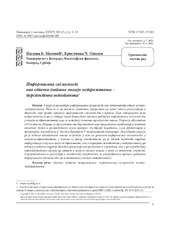Приказ основних података о документу
Informisana saglasnost kao etičko pitanje onlajn-istraživanja - perspektiva ispitanika
| dc.creator | Matović, Nataša | |
| dc.creator | Ovesni, Kristinka | |
| dc.date.accessioned | 2022-02-09T15:48:02Z | |
| dc.date.available | 2022-02-09T15:48:02Z | |
| dc.date.issued | 2021 | |
| dc.identifier.issn | 0352-2334 | |
| dc.identifier.issn | 2335-0806 (eISSN) | |
| dc.identifier.uri | http://reff.f.bg.ac.rs/handle/123456789/3454 | |
| dc.description.abstract | U radu se razmatra informisana saglasnost kao komponenta etike onlajn- -istraživanja. Polazi se od analize shvatanja, preduslova od kojih zavisi realizacija i teškoća koje prate primenu informisane saglasnosti u praksi. Cilj empirijskog dela istraživanja je da se utvrde karakteristike procesa dobijanja informisane saglasnosti u onlajn-istraživanjima i da se ispitaju činioci od kojih one zavise. Uzorak je obuhvatio 153 učitelja. Podaci su prikupljeni instrumentom koji predstavlja kombinaciju pitanja anketnog tipa i deskriptivne skale procene. Za obradu podataka, osim frekvencija i procenata, korišćen je χ2 test i Kramerov V koeficijent korelacije. Rezultati ukazuju da je većina ispitanika imala iskustvo u vezi sa davanjem informisane saglasnosti u onlajn-istraživanjima u kojima su dosad učestvovali; da je tekst najčešće sadržao informacije o svrsi i cilju istraživanja, kao i zadacima ispitanika u istraživanju; da većina učitelja sadržaj teksta procenjuje kao razumljiv i koristan; kao i da najveći broj karakteristika zavisi od sredine u kojoj se nalazi škola u kojoj su zaposleni učitelji. O rezultatima se diskutuje u kontekstu mogućnosti za unapređivanje procesa dobijanja informisane saglasnosti od ispitanika u onlajn-istraživanju. | sr |
| dc.description.abstract | The paper discusses informed consent as a component of online research ethics. It begins from the analysis of understanding, from the preconditions on which the realization depends, and from the difficulties that accompany the application of the informed consent in practice. The aim of the empirical part of the research is to determine the characteristics of the process of obtaining the informed consent in online research and to examine the factors on which they depend. The sample included 153 teachers. Data were collected with the survey-type questionnaires and with the descriptive assessment scales. For data processing, besides the frequencies and percentages, the χ2 test and Kramer ‘s V correlation coefficient were performed. The results indicate that most of the respondents have had experience of giving informed consent in online surveys in which they have participated so far; that the text often contained information about the purpose and the goal of the research, apart from the tasks of the respondents in the research; that the majority of the teachers evaluate the content of the text as understandable and useful; and also that most of the characteristics depend on the environment of the school in which the teachers are employed. The results are discussed in the context of the possibility of improvement of the process of obtaining informed consent from the respondents in the online survey. | sr |
| dc.language.iso | sr | sr |
| dc.publisher | Univerzitet u Beogradu - Učiteljski fakultet, Beograd | sr |
| dc.relation | 451-03-9/2021-14 | sr |
| dc.rights | openAccess | sr |
| dc.rights.uri | https://creativecommons.org/licenses/by/4.0/ | |
| dc.source | Inovacije u nastavi - časopis za savremenu nastavu | sr |
| dc.subject | Etička pitanja istraživanja | sr |
| dc.subject | informisana saglasnost | sr |
| dc.subject | Onlajn istraživanja | sr |
| dc.subject | ethical issues of research | sr |
| dc.subject | informed consent | sr |
| dc.subject | online research | sr |
| dc.title | Informisana saglasnost kao etičko pitanje onlajn-istraživanja - perspektiva ispitanika | sr |
| dc.type | article | sr |
| dc.rights.license | BY | sr |
| dc.citation.epage | 13 | |
| dc.citation.issue | 3 | |
| dc.citation.rank | M23 | |
| dc.citation.spage | 1 | |
| dc.citation.volume | 34 | |
| dc.identifier.doi | 10.5937/inovacije2103001M | |
| dc.identifier.fulltext | http://reff.f.bg.ac.rs/bitstream/id/7814/bitstream_7814.pdf | |
| dc.type.version | publishedVersion | sr |

